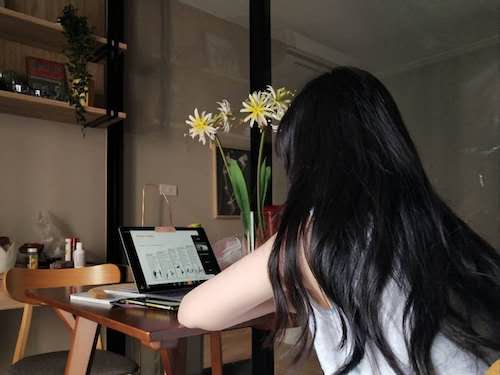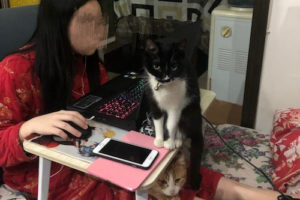
“I don’t wanna take classes,” said some who might have forgotten to unmute himself in the middle of an online lecture. Then the whole class suddenly turned silent.
“it’s boring. Let’s play Arena of Valour,” another person replied.
Then students burst into laughter as the dialogue about games kept going until the lecturer intervened.
This is what happened to Liu Chang, an international student at the University of Sydney, who has been learning from home in Wuhan.
“If the next semester is still online, I will probably defer my study,” she said.
Some students have already done that for fear that the quality of the course would be compromised when it is moved online.
But are online courses necessarily less effective than offline courses?

Are students getting less interaction in class?
Fan Chunyang, an undergraduate student studying business in USYD, said that “the quality of online courses” needed to be “improved”.
“Some of the lecturers only read the slides in front of their computer camera—their interaction with students is insufficient.
“And one of my units is about computer coding, which requires lots of practical exercises. Before the university went online, I had had four offline classes, which I felt very effective in that our tutors could actually look at our computer screen and guide us. But it is not technically possible to get the same level of guidance in online classes,” he said.
Fan added that it tended to be harder to interact with peers in Zoom break-out rooms.
“When you are taking class, the only thing you can look at is a computer screen. All your classmates are nothing but names on the screen, with which you might not have a strong impulse to communicate.”
But things tend to be different in the classes of Pam Walker, a unit coordinator, and a lecturer teaching journalism students.

“One of my tutors said to me, ‘I felt like I was talking to myself… I couldn’t see anyone. There was only one student who was on video and unmute,’” Walker said.
When Walker couldn’t see her students on video, she would “force them out” in an amusing way by “teasing” students, except for those who have a poor internet connection.
“For most of the time, I’d say at least 85 to 90% of my students are visible and unmuted,” she said.
To get students to “participate in the class”, Walker assigns students tasks.
“wen we did interviewing, I put [students] in break-out rooms for them to interview each other and then come out right a little story about the person and then talk about it to the class.
“So what I’ve done is I’ve tried to make sure that they’re not just sitting there staring at a computer, but they’re actually doing things,” she said.
“A history class or more theoretical or conceptual classes can very well be learned online and language classes as well. I think it’s more the problem of pedagogy and making best use of the technology,” said Peter Reimann, a professor of Education at the University of Sydney.
Are students less supported by the teacher?
For Liu, the upside of online courses is that she feels more comfortable to ask lecturers questions.
“Some of us, I think, are shy of asking questions in front of the whole class. And now they can talk with the lecturer freely via the chat bar,” said Fan.
Walker has offered students more time to ask her questions.
Walker said that when being in classrooms, they had to leave the classroom once the time was up because other people were trying to get in the classroom.
“[Now] when the two hours are up … I’ll stay for an hour extra, just answering questions”, she said.
“They are getting more because I’m worried about them feel unsupported or feeling isolated or feeling like they don’t know who to ask for and where to go.”
Less motivated — are students getting lazier when everything is transferred online?
“Last semester, my participation was 100%. I didn’t miss one single lecture or tutorial,” said Fan. “But this semester, I missed classes very often. Because when you are at home, your daily routine and schedule can be reshaped. And people tend to be lazier at home.

“When we are studying in the library, there is ‘invisible supervision’ — you feel compelled to study when everybody around you is studying.
“And when you are at home, your whole body is in a more relaxed state so that you feel more like doing something relaxing, like checking Facebook pages or Instagram, etc.”
Professor Reimann said that the demands for “self-regulation”, “self-discipline”, “self-motivation” and “self-monitoring” are increasing.
And he added: “Often just going into the library and going officially to a place of work or learning sort of [send] a signal to your body that this is not about sleeping. This is not to know relaxing.
“And if you work in the same little space now online, where you also have your private life and where you sleep, and where you do relaxing things, your body doesn’t quite know in which mode it should be right on.”
He also suggested: “I would really have one place even in a very little apartment, a very little studio or just one place that’s absolutely dedicated to work right on to learning and not do anything else there.
“Don’t eat, don’t watch tv, don’t play game, so that your body knows if I’m in this place, when I’m sitting at this table at this chair, it’s work.”
No need to go to the campus — A boon or a bane?
“For me, it’s a pity that I can’t physically go back to the campus. Because the experience of living in a foreign country with your friends is an integral part of studying abroad,” said Liu. “This is why most of us chose to study abroad in the first place — not only are you studying, but you are exposed to different cultures and getting to know people of different background. These can be precious experience.”

“Apart from gaining knowledge, what I also want to do is socialise with people and build my social network”, Fan said.
James Tognolini, a Professor and the Director of the Educational Measurement and Assessment Hub at the University of Sydney, said that situation varied here.
“For undergraduate students, the university experience [of] people come to the university and interact with students… is a part of their life,” he said.
“And I can see that those people would be disappointed that it’s now they missed out of that social interaction and all that sort of stuff.”
However, for postgraduates who have “already had that done”, online courses tend to be a boon.
“If I’m [a postgraduate student who is] working around, I don’t wanna come in there at five o’clock in the afternoon finding a parking place.
“They want to work at home and adjust their lives and so on.”
How about the future? Will there be more online courses?
Online courses have posed great challenges to university lecturers.
“The biggest challenge for me – and for many educators – is that we didn’t have time to transform our face-to-face classes into online content. So we are doing this as we go through the semester,” said Corinne Podger, a lecture of the University of Sydney.
Professor Reimann also said :“we had very little time to move whole courses and big programs to the online mode.
“So there was a lot of improvisation and a lot of a lot of work for a much more work through for teachers to within two weeks basically switch from a normal semester plan to online”, he said.
“[And] I haven’t heard about there no major technical problems. So I think that’s a big advantage.
“I think it’s also a great learning opportunity and scale. And I think it will be important that we as teachers and students, share our experiences and and actively try to improve and learn from our practices.
“And I think this university and others, if they are smart, they will think about not only [make online courses a] plan B but as a parallel mode of offering … [This] would be my prediction.”





Hey Muxue! I loved reading your story, I was completely absorbed. Great work
Hi Krystal, thank you for reading my story. Glad that you like it. Take care~